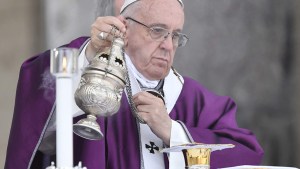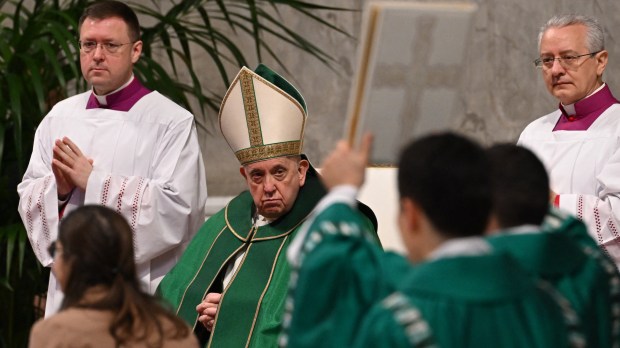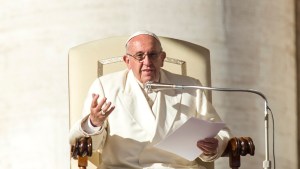On January 20, 2023, Pope Francis met diocesan liturgical leaders who had come from all over the world to attend a formation course in Rome called “Living Liturgical Action Fully.” It was held at the Pontifical University of St. Anselm from January 16-20 and focused on helping participants deepen their understanding of the liturgy.
The course was inspired by Pope Francis’ Apostolic LetterDesiderio Desideravi, published in June 2022. In it he reflected on the reform of the liturgy proposed during the Second Vatican Council, and what these celebrations, and how they are done, mean for our spiritual life.
In fact the Pope’s speech was addressed to “masters of ceremonies,” meaning those responsible for organizing the liturgy in a diocese. They especially focus on assisting parishes when the bishop comes to celebrate there or arranging the liturgy in larger churches or cathedrals. However, the Pontiff’s tips can be useful for all who attend and assist in Mass.
1. The importance of silence
“I urge you to cultivate silence” especially before the celebrations as that is when people usually socialize, Pope Francis emphasized.
“Silence helps the assembly and concelebrants to concentrate on what is to be done. […] It is silence that enables you to prepare for the mystery, it permits its assimilation, and lets the echo of the Word that is listened to resound. Fraternity is beautiful; greeting one another is beautiful, but it is the encounter with Jesus that gives meaning to our gathering, to our coming together. We must rediscover and cherish silence!” the Pope said.
2. Wonder means encountering God
Pope Francis says that it is important to “accompany the faithful” during the liturgy so that they can be “astonished at what happens in the celebration under [their] very eyes.” Rather than focus on “aesthetic joy” or “pleasure,” those assisting and organizing the Mass should leave space for the “wonder” that the faithful can experience during the ceremony. “Only the encounter with the Lord gives you wonder,” he explained.
3. The priority should always be serving the people of God
The Pontiff emphasized that the master of ceremonies’ “primary objective” is to “foster the fruitful participation of the people of God.”
“We must always keep the good of the communities, the pastoral care of the faithful before our eyes, to lead the people to Christ and Christ to the people. It is the primary objective, which must be in first place also when you prepare and guide the celebrations. If we neglect this, we will have beautiful rites, but without strength, without flavor, without meaning, because they do not touch the heart and the existence of the people of God. […] ‘A celebration that does not evangelize is not authentic’ (Desiderio desideravi, 37). It is a ‘ballet,’ a beautiful ballet, aesthetic, beautiful, but it is not an authentic celebration,” the Pope warned.
A master of ceremonies also should never replace the bishop or priest as presider of the liturgy, the Pope insisted. “The more hidden the master of ceremonies is, the better. The less he is seen, the better.”
4. Learning by living the liturgies
Pope Francis also emphasizes that the best way to learn how to celebrate the Mass is simply “by celebrating” it.
“How did we learn how to serve Mass as children? By watching our older friends do it. It is that formation from the liturgy that I wrote about in Desiderio desideravi,” the Pope explains, citing hisApostolic Letter. “Decorum, simplicity and order are achieved when everyone, gradually throughout the course of the years, attending the rite, celebrating it, living it, understand what they must do. Of course, as in a large orchestra, each person must know their own part, […] then the liturgy can be a symphony of praise.”
In fact Pope Francis urged the masters and liturgical leaders to get involved in schools of liturgical practice in cathedrals or seminaries in order to teach future priests “how to celebrate well.” The Head of the Catholic Church also encouraged the masters to learn from the communities themselves by observing whatever “celebratory style” is lived in each parish.
“It is pointless to put on a nice ‘parade’ when the bishop is there, and then to return to how it was before. Your task is not to arrange the rite for one day, but to propose a liturgy that is imitable, with those adaptations that the community can embrace in order to grow in the liturgical life. […] Indeed, going to the parishes and saying nothing in the face of liturgies that are a little slapdash, neglected, badly prepared, means not helping the communities, not accompanying them,” the Pope explained.
5. Good and short homilies!
Finally, the Pope had some emphatic advice for priests giving homilies:
“Please, the homilies: they are a disaster,” the Pope lamented, while strongly encouraging all priests to put effort into their preaching.
“At times I hear someone [say]: ‘Yes, I went to Mass in that parish … yes, a good lesson of philosophy, 40, 45 minutes …’
“Eight, 10 [minutes] no more! And always a thought, a sentiment and an image. Let people take something home with them,” the Pontiff said. “The homily is not a conference, it is a sacramental. […] It is prepared in prayer, it is prepared with an apostolic spirit.”



